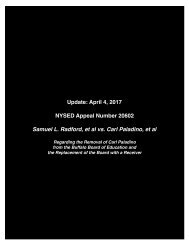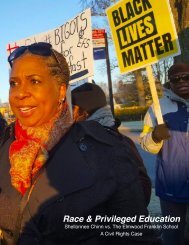A 163 Year Sentence
- No tags were found...
Create successful ePaper yourself
Turn your PDF publications into a flip-book with our unique Google optimized e-Paper software.
himself.<br />
At the center of it all<br />
The man prosecutors were after says he has never broken the law. You can see in Dominic Okongwu the<br />
strict bearing of the Nigerian Army officer that he was when he fought in the Nigerian Civil War, also<br />
known as the Biafran War, in the late 1960s.<br />
He’s not a large man, but he speaks with a deep voice that serves him well in his church choir. At 64,<br />
Okongwu is no longer apple-cheeked and vibrant. He tries to dress sharp on limited means, but he often<br />
looks weary.<br />
Okongwu’s English is excellent, but a thick accent makes him difficult to understand. When he worked as<br />
a teachers’ assistant in prison, he was amazed at the poor math skills he saw. He says some of his inmatestudents<br />
came to like him and would protect him. “Africa,” they would call him. Other inmates would call<br />
him “Rape-O.”<br />
As Okongwu tells his story, his face pinches, like he bit into a lemon, at the thought of anyone molesting<br />
children, especially their own children. He then becomes angry about the parade of lawyers who<br />
suggested he take a plea, either for the initial trial or for the retrial that never occurred. Like his codefendants,<br />
he refused each time.<br />
“You are a stubborn man,” one lawyer told him, according to Okongwu.<br />
“Yes,” he responded. “I am stubborn for my innocence.”<br />
He earned a bachelor’s degree from the University at Buffalo, then a master’s in business administration<br />
from the University of New Haven, Conn., in 1984. That year, his twin daughters were born prematurely<br />
in Women and Children’s Hospital in Buffalo. When their mother’s bad health forced her back to Nigeria<br />
and the care of her family, it fell to Okongwu to raise young Chendo and Nnedi – pronounced Ned-E –<br />
and earn a living.<br />
He says he spent most of his time working to support them – during the day as a substitute teacher in the<br />
Buffalo school system and in the evening at Rich Products.<br />
He left the children during the week with a sitter, and the girls came to know the sitter and her boyfriend<br />
better than they knew their father.<br />
The arrangement that caused Okongwu to be a distant father in the 1980s laid the groundwork for the<br />
wrongful convictions of him and his co-defendants late in 1993 – because when prosecutors first heard<br />
the allegations of rape, they soon learned Dominic Okongwu had a history.<br />
The first case of abuse<br />
In 1988, when the girls were still 3, their father was suspected of abusing them. Their hymens were<br />
examined and deemed atypical for toddlers. The abnormalities, which included scarring on one child,<br />
could mean they were abused, doctors said. But suspicions shifted from Okongwu to the sitter’s<br />
boyfriend, a man later convicted of stabbing a woman to death.<br />
“There really was a legitimate reason to lay it upon him,” attorney Paul V. Hurley, a former prosecutor,<br />
said of the boyfriend.<br />
Hurley, now retired, represented Okongwu in the matter at the request of local Nigerians and people<br />
from Okongwu’s Catholic church at the time, the Newman Center at Buffalo State College.<br />
No one was convicted of sexual abuse. But Family Court Judge John J. Honan found Okongwu guilty of<br />
neglect for boarding out the twins five or six days of the week.<br />
While county lawyers continued to suspect Okongwu, he was forced to attend counseling and to learn<br />
better parenting skills. His daughters were placed in foster care – in the bungalow-style home of Ollie<br />
McNair on Poultney Avenue, near East Amherst Street, in Buffalo. On weekends, holidays and on the<br />
girls’ birthday, their father could take them to his apartment on Debra Lane in North Buffalo. But the<br />
visits had to be supervised throughout.<br />
To oversee the visits, the court entrusted Louis Eze. He was a cousin of Okongwu and also from Nigeria’s<br />
Igbo region. Eze had lived with Okongwu for months when he first came to Buffalo. The girls were fond






